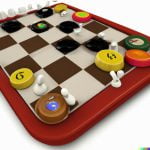Are you passionate about board games and looking to up your strategic gameplay? Welcome to our Board Game Strategy Guide, where we delve into the world of tactical thinking, thoughtful planning, and skillful execution. Whether you’re a beginner or a seasoned player, mastering game strategy is key to claiming victory on the board. In this guide, we’ll explore the importance of strategy in board games and examine the benefits of using a strategy guide to elevate your gameplay.
Understanding the significance of strategy in board games is crucial for players who aim to outwit their opponents and emerge triumphant. With our comprehensive strategy guide, you’ll have access to valuable insights that will enhance your understanding of strategic gameplay and help you develop winning tactics. From choosing the right game to refining your strategies through practice and testing, every aspect of strategic gameplay will be covered in detail.
The journey through this blog post begins with setting the tone for developing an effective game strategy by emphasizing its critical role in achieving success on the board. We’ll navigate through various factors that shape strategic decision-making, such as choosing the right board game, understanding game rules, analyzing game components, and learning from expert players. By immersing yourself in this comprehensive guide, you’ll gain the knowledge and skills needed to excel in any board game scenario.
Choosing the Right Board Game
When embarking on a board game journey, selecting the right game to strategize for is crucial. There are several factors to consider when making this decision. Firstly, consider the complexity of the game. Some players may enjoy a game with intricate and multifaceted strategies, while others may prefer a more straightforward approach. Understanding your strategic preferences will help narrow down your choices.
Popular board games with complex strategies include “Settlers of Catan,” “Terraforming Mars,” and “Twilight Struggle.” These games require careful planning, resource management, and long-term strategy development. For those who are new to strategy-based board games, it is recommended to start with simpler games such as “Ticket to Ride” or “Carcassonne” before moving on to more complex ones.
To identify the best game for your strategic preferences, it’s important to consider the gameplay dynamics and themes that you find appealing. Whether you prefer resource management, area control, or tactical combat, there is a board game out there that suits your strategic inclinations. Additionally, seeking recommendations from other players or reviewing board game strategy guides can provide valuable insights into which games align with your interests and play style.
| Factors to Consider | Examples of Popular Games |
|---|---|
| Game complexity and player preferences | “Settlers of Catan,” “Terraforming Mars,” “Twilight Struggle” |
| Gameplay dynamics and themes | “Ticket to Ride,” “Carcassonne” |
Understanding the Rules
A crucial aspect of mastering any board game strategy is thoroughly understanding the game’s rules. Without a deep comprehension of the rules, it becomes challenging to formulate and execute effective strategies. The rules of a game provide the framework within which players operate, and a solid understanding of these rules can be an invaluable asset in strategic decision-making.
One strategy for interpreting and implementing game rules effectively is to engage in multiple playthroughs of the game. This allows players to familiarize themselves with the various rules and mechanics, gaining a more nuanced understanding of how different aspects of the game interact. Additionally, discussing the rules with fellow players and seeking clarification on any confusing or ambiguous points can provide further insight into how to best leverage them strategically.
A thorough knowledge of the game’s rules also contributes to successful gameplay by ensuring that players are able to avoid rule violations and capitalize on opportunities presented within the confines of the established framework. By interpreting and implementing the rules effectively, players can position themselves to make informed strategic decisions that align with their overall objectives in the game.
| Understanding Rules Tips | Example Board Games |
|---|---|
| Engage in multiple playthroughs for rule familiarity | Terraforming Mars, Twilight Struggle |
| Discuss rules with fellow players for insights | Catan, Ticket to Ride |
| Avoid rule violations for strategic advantage | Pandemic, Puerto Rico |
Analyzing Game Components
Understanding and analyzing the different game components in a board game is crucial in formulating a winning strategy. Whether it’s the board, cards, tokens, or pieces, each component plays a crucial role in strategic decision-making. By closely examining and understanding these components, players can gain a competitive edge and improve their chances of success.
The Importance of Analyzing Game Components
Analyzing game components allows players to identify key elements that can impact their strategic decisions. For example, in a game with resource management, understanding the scarcity and distribution of resources can help players plan their moves more effectively. Similarly, in games with variable player powers, knowing the strengths and weaknesses of each power can influence strategic choices.
Tips for Leveraging Game Components
Once players have identified the important game components, they can leverage this knowledge to their advantage. This may include optimizing the use of certain cards or pieces, controlling key areas of the board, or timing actions for maximum impact. By capitalizing on these components, players can enhance their overall strategy and increase their chances of success.
Utilizing Game Components to Gain a Competitive Edge
By thoroughly analyzing game components and leveraging them strategically, players can gain a competitive edge over their opponents. This may involve anticipating opponents’ moves based on their access to certain game components or using specific components to counter rival strategies. Understanding how to utilize game components effectively is essential for developing a solid board game strategy guide and improving gameplay outcomes.
Developing a Winning Strategy
When it comes to board games, having a winning strategy is essential for coming out on top. Whether you are playing a game of skill, chance, or a combination of both, having a clear plan of action can significantly increase your chances of success. In this section, we will explore the steps for developing a solid game strategy, provide examples of strategic approaches for different types of board games, and discuss how to adapt and adjust strategies during gameplay.
Steps for Developing a Solid Game Strategy
The first step in developing a winning strategy is to thoroughly understand the game you are playing. This involves familiarizing yourself with the rules, understanding the roles and capabilities of each player or piece, and identifying the main objective of the game. Once you have a good grasp of these foundational elements, you can start formulating your overall strategy.
Next, it’s important to analyze the strengths and weaknesses of your position within the game. Whether it’s assessing your starting resources, evaluating potential risks and rewards, or identifying areas where you can gain an advantage over other players, taking stock of your position is crucial for creating an effective game plan.
Finally, adapting and adjusting your strategy during gameplay is imperative for maintaining a competitive edge. As the dynamics of the game change and new opportunities or obstacles arise, being able to pivot and modify your approach accordingly can make all the difference between winning and losing.
Examples of Strategic Approaches for Different Types of Board Games
Different board games require different strategic approaches. For example, in games that involve resource management like Settlers of Catan or Agricola, focusing on acquiring and efficiently using resources may be key to victory. On the other hand, in games that involve territory control such as Risk or Diplomacy, strategic positioning and diplomacy with opponents may take precedence.
In addition to these examples, there are many other strategic considerations unique to specific board games. Understanding these nuances and learning from experienced players can help you develop winning strategies tailored to each game’s unique mechanics.
–
Learning From Expert Players
When it comes to honing your board game skills, learning from expert players can be incredibly valuable. Whether you’re a beginner looking to improve or an experienced player aiming to take your strategy to the next level, studying the gameplay of experts can provide insight and inspiration. Here are some ways you can learn from expert players:
1. Watch and Learn: Many expert board gamers share their gameplay on platforms like YouTube or Twitch, offering commentary on their strategic decisions as they play. Watching these videos can give you a firsthand look at how top players approach the game, helping you understand their thought process and decision-making.
2. Engage in Discussion: Participating in online forums or social media groups dedicated to specific board games can connect you with seasoned players who are willing to share their insights and tips. Engaging in discussions about strategy and gameplay can offer you different perspectives and strategies that you might not have considered.
3. Utilize Strategy Guides: There are numerous board game strategy guides available in bookstores, online retailers, and gaming communities. These guides often dissect popular games and provide comprehensive analysis of winning strategies employed by expert players. By reading these guides, you can gain a deeper understanding of the game’s mechanics and the most effective tactics for success.
By incorporating strategies learned from expert players into your own gameplay, you’ll be better equipped to make informed decisions during your gaming sessions. Not only will this elevate your performance in existing games, but it will also enhance your ability to adapt and develop new strategies for future challenges. Learning from those who excel in the game can ultimately help you become a more skilled and strategic player yourself.
Practice, Practice, Practice
When it comes to mastering board game strategy, there is no substitute for practice. Consistent and deliberate practice is essential for honing your strategic skills and improving your gameplay. Here are some effective practice techniques for enhancing your strategic abilities:
- Solo Play: One of the best ways to practice board game strategy is through solo play. This allows you to experiment with different strategies and tactics without the pressure of competing against other players. It also provides an opportunity to thoroughly understand the game’s mechanics and rules.
- Online Simulators: Many board games have online simulators or digital versions that allow you to play against computer opponents or other players. Using these platforms can provide a convenient way to practice your strategies, try out new tactics, and improve your decision-making skills.
- Analyze Your Past Games: Another valuable practice technique is to review and analyze your past games. Look for areas where your strategies were successful and identify any weaknesses or mistakes that may have led to a loss. This self-analysis can help you identify patterns in your gameplay and make adjustments accordingly.
Consistent Practice Contributes to Mastering Game Strategy
By consistently practicing these techniques, you can improve your strategic thinking and decision-making in board games. Remember that mastering game strategy takes time and effort, so be patient with yourself as you work towards becoming a more proficient player.
As a key resource in honing your board game strategy, a board game strategy guide can provide valuable insights into effective gaming techniques, tactics, and approaches specific to certain games. Whether you’re a novice or an experienced player looking to up their game, utilizing a board game strategy guide can enhance your overall gaming experience.
Testing Your Strategy
In conclusion, the board game strategy guide provides a comprehensive framework for players to build and enhance their strategizing skills in various board games. By understanding the importance of strategy and leveraging the benefits of using a strategy guide, players can elevate their gameplay and strive for victory.
Choosing the right board game is crucial in honing strategic thinking, as players need to consider factors such as complexity and personal preferences. Understanding the rules and analyzing game components are also essential steps in formulating effective strategies.
Developing a winning strategy involves thorough planning and adaptation, with examples of strategic approaches offered for different types of board games. Learning from expert players and practicing consistently are also highlighted as valuable means to improve strategic gameplay. Lastly, testing and refining strategies play a significant role in ensuring their effectiveness, with tips provided for evaluating strategies based on testing results and gameplay experience.
Overall, the board game strategy guide emphasizes the importance of strategic thinking in board games and offers practical advice for players to enhance their gaming experience through effective strategizing. Whether it’s analyzing game components or honing skills through consistent practice, this guide serves as a valuable resource for anyone looking to improve their game strategy.
With the right approach and dedication to learning from expert players, players can take their gaming expertise to new heights by bringing intelligent and calculated moves to the table.
Frequently Asked Questions
How Do You Strategize in Board Games?
When strategizing in board games, it’s important to first understand the rules and objectives of the game. Then, consider your opponents’ moves and think several steps ahead to anticipate their strategies. Effective communication and teamwork with your fellow players can also be crucial in developing a winning strategy.
What Are 3 Elements That Make a Board Game Good?
Three elements that make a board game good are engaging gameplay, clear rules, and balance. Engaging gameplay keeps players interested and entertained, while clear rules ensure that everyone understands how to play. Balance is important to create a fair playing field for all participants.
What Are the 10 Elements of a Good Board Game?
The 10 elements of a good board game include theme, mechanics, player interaction, balance, replayability, components, artwork, innovation, clear rules, and fun factor. A compelling theme can draw players in while well-designed mechanics keep the game interesting. Player interaction adds depth to the experience while balance ensures fairness for all participants. Replayability allows for continued enjoyment and value from the game.
High-quality components and artwork enhance the overall experience. Innovation helps the game stand out among others in its genre. Clear rules are essential for smooth gameplay and enjoyment by all players. And ultimately, a good board game should be fun to play!

I love playing all kinds of games – from classics like Monopoly to modern favourites like Ticket to Ride.
I created this blog as a way to share my love of board games with others, and provide information on the latest releases and news in the industry.





